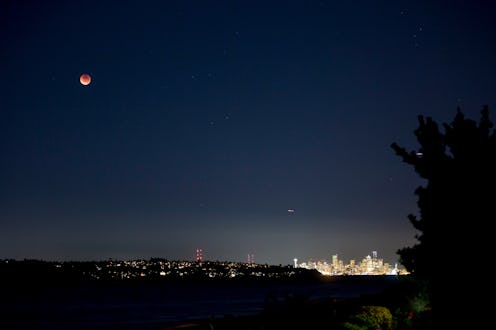Life
3 Cool Celestial Events Are Happening On Friday
The calendar year brings us mesmerizing moons, meteor showers, and other incredible celestial happenings; rarely, though, do three separate events happen on one night. But amazingly, that's what you can expect in just a few days: The Snow Moon, a penumbral lunar eclipse, and a comet will be visible simultaneously on Feb. 10, 2017, making it an Instagram-worthy night you'll want to get outside for.
This will be 2017's second full moon (the first happened on Jan. 12); it'll rise at 5:18 p.m. EST, peak at 7:33 p.m., and set at 6:33 a.m, giving you lots of time for moon-gazing. February's full moon was nicknamed the Snow Moon because this is typically the month with the heaviest snowfall. Fun fact: Native Americans also called it the Hunger Moon, since it makes hunting so difficult.
As far as the penumbral lunar eclipse goes... well, let's start with what it is. This type of eclipse occurs when the Sun, Earth, and Moon are in almost a perfectly straight line. The Earth blocks some of the sunlight from hitting the moon's surface (which is what makes the moon shine), and part of the moon is covered in shadow — the penumbra.
The rest of the moon gets the same amount of light and is as bright as a typical full moon. In fact, it's often mistaken for a full moon. (Ironic, given that this particular penumbral lunar eclipse actually is happening during a full moon.)
February's penumbral lunar eclipse starts at 5:34 p.m. EST, peaks at 7:43 p.m., and ends at 9:53 p.m. Friday. It will be visible from Europe, Africa, and most of Asia and North America.
As for the comet, Comet 45P actually started its journey at the end of 2016. However, it's going to come closest to Earth on Feb. 11, coming it at only 7.4 million miles away. This means that on Feb. 10, it will also be super close to our little green and blue planet. It can be seen from Earth every 5.25 years, and Feb. 10 and 11 are going to provide a view like no other. To see it, look toward the constellation Hercules. Enjoy it now while you can — because who wants to wait until 2022 to see it once more?! (Not me.)
It's true that hanging out outside at night in this chilly weather may not be at the forefront of your mind; for many of us, the temperatures are frigid during the day and even colder once the Sun sets.
But it's sometimes the little things in life that leave a lasting impact. Make time on Feb. 10 for a little stargazing. You won't regret it.
